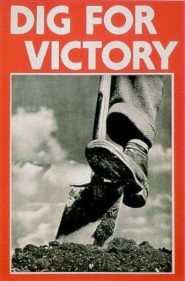Rationing
With the Germans sinking many of our merchant vessels with their U-Boats restricting what got through, pressure was placed on the farmers to produce as much food as they could to save a nation from starving and, ultimately, surrendering to Hitler. Despite the farmers best efforts the nation as a whole had to join in and grow as much as they could. This helped enormously and helped to win the war but what food there was had to be rationed out on a fair basis so everyone had the same share both rich and poor.
Rationing was the only option. It would prevent waste, it would offer the best possible nutritional levels across the entire population, and it would offer a feeling of fairness. The fairness was important and became increasingly so as the war progressed. As the war effort demanded more and more effort from people, often with longer working hours in harsher conditions, that feeling of fairness, of being ‘all in it together’ was to be a major tool in getting people to cooperate. (I have heard these words before ‘we are all in this together’; maybe Mr Cameron and his cronies from the banks would to share out their wealth just so we really feel we are all in this mess together?)
Fairness with food was the lynchpin of much what we like to call ‘the Blitz spirit’ of wartime Britain. The rich might well find rationing hard and restrictive, but to the poor it had a whole different character. Rationing was not distributed free, of course, you had to pay for it. The ration was not an entitlement as such; it was a limit on the amount you could buy.Having carefully calculated the nutritional needs of the population to the best scientific knowledge of the day and allocated resources accordingly, the food planners were keen that everyone should eat their entire ration and gain the maximum health benefits from this carefully balanced scheme. But it still came down to money for many despite hardly anyone being out of work. Thanks to Wartime Farm for allowing me to use their book as reference.
As l write this l have found out it is 60 years ago to the day, 3rd October 1952, that tea rationing finished!
A TYPICAL WEEKLY RATION FOR ONE ADULT
4oz bacon and ham 12oz sugar 2oz tea 1oz cheese 2oz preserves 2oz cooking fat 4oz butter 1s 2d (6p) of meat 1 egg 2-3 pints (1.2-1.8 litres) of milk









